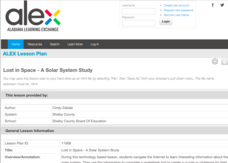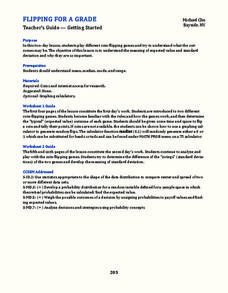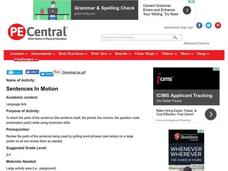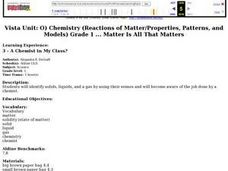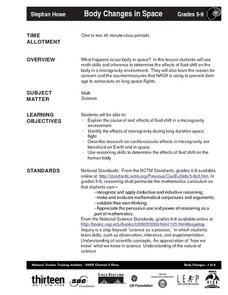Curated OER
Internet Activity: More Space About Space
Learners analyze the exploration of space. In this space lesson, students discuss the space race of the 1950s and 1960s. Learners identify important events in space exploration and analyze the reasons for a space station.
Curated OER
HISTORY OF SCIENCE: ASTRONAUTS
Students study the pioneers of space exploration and travel; identify some of the early astronauts who prepared the way for others; examine the social and political conditions at the dawn of the Space Age; and differentiate among space...
Alabama Learning Exchange (ALEX)
Lost in Space - A Solar System Study
Fourth graders study the planets of our Solar System collecting data on a worksheet. They use online tools to create a puzzle or other digital product using the information from their research.
Curated OER
Lift Off with Rockets!
Students obtain information concerning rockets and the use of them in space, create their own rocket on the computer with the graphic choices on the website www.goobo.com, and write descriptive words or phrases to describe their rockets.
Curated OER
Eye in the Sky
Students use the Internet to broaden their knowledge and understanding of the Hubble Space Telescope by participating in an Internet scavenger hunt, searching for information about the objectives, past successes and repair of the telescope.
Curated OER
Land Safely...
Learners model the preparation needed for a soft-landing on a planet or object in space. They do this by packaging a raw egg with certain material, and dropping the egg from a given height to test the packaging effectiveness.
Curated OER
Spaceship Earth
Students study the earth as a system, and the fragility of that system when population, and pollution, are considered as interactive parts of earth.
Curated OER
Space Concepts and Movement Drills
Students identify and practice how to develop a greater understanding of direction, speed and relationship to movement. They travel through the open space at the centre of the grid marked by the teacher on the floor and reach the safe...
Curated OER
Flipping for a Grade
What happens when your teachers get tired of grading tests and want to use games of chance to determine your grade? How would you decide which game they should play? Learn how to use expected value and standard notation to compare two...
Scholastic
Study Jams! A Day on Earth
It's good thing that it isn't up to RJ to spin the earth on its axis; he can't even keep a basketball spinning! In this video animation, he and viewers learn about Earth's movements in space. One thing to consider before you use this...
Curated OER
Sentences In Motion
Explore the elements needed to make up a sentence (the sentence itself, the period, the comma, the question mark, and the exclamation point), with this language arts lesson. A loco-motor activity is embedded in the teaching of the...
Curated OER
I Wonder What Would Happen if Lots of Manduca Lived in a Small Place...
Students discuss the reasons why humans fight and look for similiarties in animals. They make predictions on what they think will happen when they observe insect crowding. They make conclusions about their predictions to end the lesson...
Curated OER
Slavery in Colonial America
Students examine the experience of the middle passage of slaves. They review slave songs and discuss their common themes. They develop a monologue in which they integrate a fragment of an actual slave song into a poem they have written.
Polk Bros Foundation
I Can Analyze Cause and Effect
Examine cause and effect by asking pupils to fill out a basic graphic organizer. The template is for any story or event and provides a line for writing in the story or event title. Pupils write in two causes in the circles and the change...
Curated OER
Far-out Astronomy in a Suitcase
Ninth graders engage in a web-based research activity. They use a teacher provided worksheet to guide their research through the website. This lesson provide a excellent opportunity to showcase Canadians astronomy and space science...
Curated OER
Illustrations in Report Writing
Students create a short report using all the steps in the writing process including a bibliography. They explore different pictures that relate to their topic and download an image for the internet into their report. A helpful rubric is...
Curated OER
Printable Story Starter: Treasure in the Daisies
Class members can practice using sensory details and imagery with this writing prompt, which provides a vivid introduction about a girl who discovers a treasure box in her mother's garden. The middle, ending, and title of the story are...
Curated OER
Talking About Your Name in Math Terms
Add imagination and creativity to your math lesson. Young mathematicians investigate ways to express their names in mathematical terms. For instance, they can count the number of letters, analyze the geometric shapes of the letters, or...
Curated OER
A Chemist in My Class?
First graders in kindergarten science class discuss matter. They make predictions and then identify mystery items in brown paper bags as either solid, liquid, or gas by using their senses. They discuss that a chemist is a scientist that...
Curated OER
Patterns in Dance and Math
Students analyze how repeated body movements and shapes can represent and extend patterns. In this pattern analysis lesson, students discuss patterns in dance, math, and everyday living. Students demonstrate a dance using a sequence of...
Curated OER
Body Changes in Space
Learners explain the cause of and effects of fluid shift in a microgravity
environment. Students identify the effects of microgravity during long duration space flight. Learners describe research on cardiovascular effects in microgravity...
K20 LEARN
Words Before Blows: Julius Caesar
Scholars examine how Brutus and Mark Antony employ ethos, pathos, and logos in their speeches to persuade the angry crowd in Act 3, scene 2 of William Shakespeare's tragedy, Julius Caesar. To set the stage, groups first identify the...
Super Teacher Worksheets
Our Solar System Scavenger Hunt Activity
Send students on a search for facts about the solar system with this scavenger hunt activity. Whether they are finding out how far the sun is from the earth, or the names of all four gas giants, this resource will engage young scientists...
EngageNY
Counting Rules—The Fundamental Counting Principle and Permutations
Count the benefits of using the resource. The second installment of a 21-part module focuses on the fundamental counting principle to determine the number of outcomes in a sample space. It formalizes concepts of permutations and...




